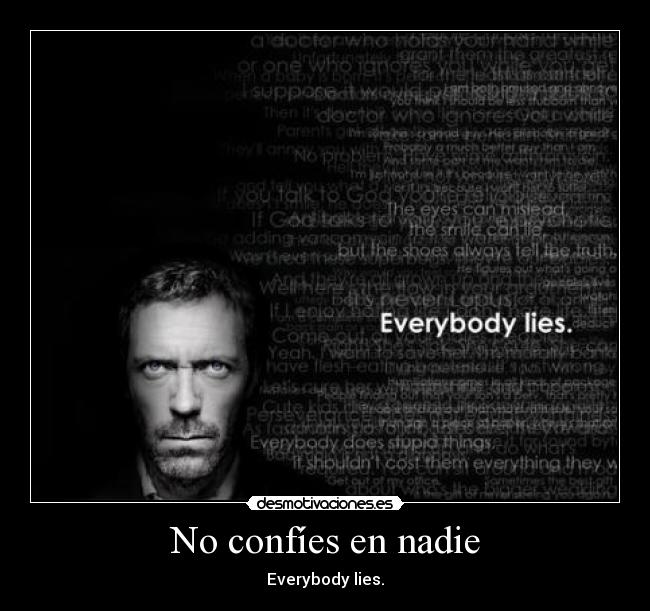Understanding The Meaning And Context
In the realm of human interactions, trust plays a pivotal role in fostering relationships and maintaining social harmony. However, there are instances where trust is broken, leading to a sense of betrayal and disillusionment. This sentiment is often expressed through the phrase "no confies en nadie," which translates to "trust no one" in English.
The phrase "no confies en nadie" carries a deep sense of skepticism and caution, suggesting that individuals should exercise prudence and discernment when placing their trust in others. This sentiment may arise from personal experiences of betrayal, witnessing instances of deception, or simply a pessimistic outlook on human nature.
While the phrase "no confies en nadie" may appear extreme, it highlights the importance of being vigilant and discerning in our interactions with others. In the following paragraphs, we will explore the various contexts in which this phrase is used, examining the underlying reasons and implications.
No Confies En Nadie Frases
Trust no one phrases convey a message of caution and skepticism towards trusting others.
- Caution in relationships
- Skepticism of human nature
- Expression of betrayal
These phrases often reflect personal experiences, societal observations, or pessimistic views on human behavior.
Caution in relationships
In the context of relationships, the phrase "no confies en nadie" reflects a cautious approach to trusting others.
- Protecting oneself from hurt:
Trusting someone involves making oneself vulnerable to potential betrayal or disappointment. The phrase "no confies en nadie" may be used as a defense mechanism to protect oneself from emotional pain.
- Realistic expectations:
This phrase can also indicate a realistic understanding of human nature. It acknowledges that people are capable of both good and bad actions, and that trusting someone blindly can lead to disappointment.
- Past experiences:
Personal experiences of betrayal or witnessing others being betrayed can contribute to a cautious approach to trust. The phrase "no confies en nadie" may reflect a learned response to protect oneself from further hurt.
- Cultural influences:
Cultural norms and values can also shape one's views on trust. In some cultures, there may be a greater emphasis on self-reliance and independence, leading to a more cautious approach to trusting others.
While caution in relationships can be a protective measure, it is important to find a balance between self-protection and openness to forming meaningful connections with others.
Skepticism of human nature
Skepticism of human nature is a belief that humans are inherently flawed and self-interested. This belief can lead to a cautious approach to trusting others, as it assumes that people are more likely to act in their own self-interest than in the interest of others.
There are several factors that can contribute to skepticism of human nature. These include:
- Personal experiences:
Personal experiences of betrayal, deception, or disappointment can lead to a negative view of human nature. When someone has been hurt by others, they may become less trusting and more skeptical of others' intentions. - Cultural influences:
Cultural norms and values can also shape one's views on human nature. In some cultures, there may be a greater emphasis on individualism and competition, which can lead to a more pessimistic view of human nature. - Philosophical and religious beliefs:
Philosophical and religious beliefs can also influence one's views on human nature. Some philosophical and religious traditions emphasize the inherent goodness of humans, while others emphasize the inherent sinfulness or selfishness of humans.
Skepticism of human nature can have a significant impact on one's relationships and interactions with others. It can lead to a lack of trust, suspicion, and difficulty forming close relationships. It can also lead to a pessimistic outlook on life and a belief that the world is a dangerous and unpredictable place.
It is important to note that skepticism of human nature is not always a negative trait. It can lead to a healthy sense of caution and discernment in one's interactions with others. However, it is important to avoid becoming overly cynical or pessimistic, as this can lead to isolation and a lack of meaningful connections with others.
Expression of betrayal
The phrase "no confies en nadie" can also be used as an expression of betrayal. When someone has been betrayed by someone they trusted, they may feel愤怒, hurt, and disillusioned. The phrase "no confies en nadie" can be a way of expressing these emotions and communicating to others that they are no longer willing to trust anyone.
Betrayal can take many forms, such as:
- Broken promises:
When someone makes a promise and then breaks it, it can be a betrayal of trust. This can be especially hurtful if the promise was important to the person who was betrayed. - Infidelity:
Infidelity is a betrayal of trust in a romantic relationship. It can be devastating to the person who is betrayed, as it can lead to feelings of betrayal, anger, and loss. - Betrayal of confidence:
When someone shares a secret with someone else and that person then shares it with someone else without permission, it is a betrayal of confidence. This can be especially hurtful if the secret was personal or sensitive. - Betrayal of friendship:
When a friend does something to intentionally hurt or harm another friend, it is a betrayal of friendship. This can be especially painful, as friends are supposed to be people who we can trust and rely on.
When someone has been betrayed, they may feel a range of emotions, including anger, hurt, sadness, and disillusionment. They may also lose trust in others and become more withdrawn and isolated.
It is important to note that not all betrayals are intentional. Sometimes, people betray others without realizing it. For example, someone may share a secret without realizing that it was supposed to be kept confidential. In these cases, it is important to communicate with the person who was betrayed and try to rebuild trust.
FAQ
Here are some frequently asked questions about the phrase "no confies en nadie" (trust no one):
Question 1: What does the phrase "no confies en nadie" mean?
Answer 1: The phrase "no confies en nadie" is a Spanish phrase that means "trust no one." It is a strong statement that expresses a lack of trust in others.
Question 2: Why do people say "no confies en nadie"?
Answer 2: There are many reasons why people might say "no confies en nadie." Some people may have had negative experiences with trusting others, leading them to become more skeptical and cautious. Others may have a pessimistic view of human nature, believing that people are inherently selfish and untrustworthy.
Question 3: Is it always bad to trust others?
Answer 3: No, it is not always bad to trust others. Trust is an important part of human relationships. However, it is important to be discerning about who you trust. Not everyone is trustworthy, and it is important to use your judgment to decide who you can trust.
Question 4: How can I know who I can trust?
Answer 4: There is no surefire way to know who you can trust, but there are some things you can look for. Pay attention to people's actions, not just their words. Consider their past behavior and reputation. Trust your gut instinct, as it can often pick up on things that your conscious mind may miss.
Question 5: What should I do if I have been betrayed by someone I trusted?
Answer 5: If you have been betrayed by someone you trusted, it is important to allow yourself to feel the emotions that come with that, such as anger, hurt, and sadness. It is also important to talk to someone you trust about what happened. Once you have had time to process your emotions, you can start to rebuild your trust in others, but it is important to take things slowly and be cautious.
Question 6: Is it possible to live a happy and fulfilling life without trusting anyone?
Answer 6: It is possible to live a happy and fulfilling life without trusting anyone, but it would be very difficult. Trust is an essential part of human relationships, and without it, it would be difficult to form close bonds with others. However, it is important to remember that trust is not something that should be given blindly. It is important to be discerning about who you trust, and to only trust people who have earned your trust.
Closing Paragraph:
Ultimately, the decision of whether or not to trust someone is a personal one. There is no right or wrong answer, and what is right for one person may not be right for another. However, it is important to be aware of the risks and benefits of trusting others, and to make decisions that are in your best interests.
In addition to the FAQ, here are some tips for dealing with trust issues:
Tips
Here are some practical tips for dealing with trust issues:
Tip 1: Be honest with yourself about your trust issues.
The first step to dealing with trust issues is to be honest with yourself about them. What are your triggers? What situations make you feel distrustful? Once you understand your trust issues, you can start to work on them.
Tip 2: Challenge your negative thoughts.
When you find yourself having negative thoughts about others, challenge them. Ask yourself if there is any evidence to support these thoughts. Are you making assumptions about people based on past experiences? It is important to remember that not everyone is the same, and that just because you have been betrayed by someone in the past does not mean that everyone will betray you.
Tip 3: Take things slowly.
When you are trying to rebuild trust, it is important to take things slowly. Don't try to force yourself to trust someone overnight. Start by taking small steps, such as sharing small pieces of information with the person or spending more time with them in low-stakes situations. As you get to know the person better, you can gradually start to trust them more.
Tip 4: Communicate your needs.
It is important to communicate your needs to the people you are trying to trust. Let them know what you need from them in order to feel safe and secure. For example, you might need them to be honest with you, to keep their promises, or to be there for you when you need them. By communicating your needs, you can help the other person to understand what they need to do to earn your trust.
Closing Paragraph:
Dealing with trust issues takes time and effort, but it is possible to overcome them. By following these tips, you can start to rebuild trust in others and live a more fulfilling life.
In conclusion, the phrase "no confies en nadie" (trust no one) is a strong statement that reflects a lack of trust in others. While there are many reasons why people might say this, it is important to remember that trust is an essential part of human relationships. Without trust, it would be difficult to form close bonds with others and live a happy and fulfilling life.
Conclusion
The phrase "no confies en nadie" (trust no one) is a strong statement that reflects a lack of trust in others. While there are many reasons why people might say this, it is important to remember that trust is an essential part of human relationships. Without trust, it would be difficult to form close bonds with others and live a happy and fulfilling life.
The main points that have been discussed in this article are as follows:
- The phrase "no confies en nadie" can be used to express caution in relationships, skepticism of human nature, or as an expression of betrayal.
- Caution in relationships is a protective measure that can help to prevent being hurt by others. However, it is important to find a balance between self-protection and openness to forming meaningful connections with others.
- Skepticism of human nature is a belief that humans are inherently flawed and self-interested. This belief can lead to a lack of trust in others and difficulty forming close relationships.
- An expression of betrayal is a way of communicating to others that trust has been broken. Betrayal can take many forms, such as broken promises, infidelity, betrayal of confidence, or betrayal of friendship.
In conclusion, the phrase "no confies en nadie" is a complex statement that can have a significant impact on one's relationships and interactions with others. It is important to understand the different reasons why people might say this phrase and to consider the potential consequences of trusting or not trusting others.
Ultimately, the decision of whether or not to trust someone is a personal one. There is no right or wrong answer, and what is right for one person may not be right for another. However, it is important to be aware of the risks and benefits of trusting others, and to make decisions that are in your best interests.
Loyal Order Of Moose Danbury CT
Longest Arms In The World: A Journey Of Extraordinary Limbs
Green And Black Knotless Braids

No Confíes En Nadie Desmotivaciones

No confíes en nadie, Desmotivaciones

No confíes en nadie Desmotivaciones
ncG1vNJzZmigkZe2o32NmqSsa16Ztqi105qjqJuVlru0vMCcnKxmk6S6cLrOZpqoppaesrR5xKdkp5mUnrJustGaqp6rXp3Brrg%3D